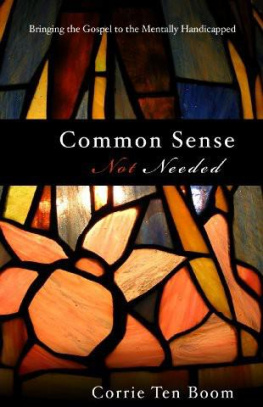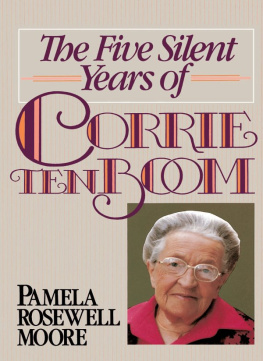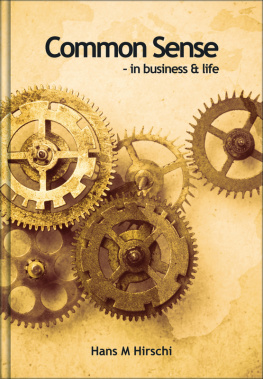Corrie Ten Boom - Common sense not needed
Here you can read online Corrie Ten Boom - Common sense not needed full text of the book (entire story) in english for free. Download pdf and epub, get meaning, cover and reviews about this ebook. year: 1968, publisher: Christian Literature, genre: Detective and thriller. Description of the work, (preface) as well as reviews are available. Best literature library LitArk.com created for fans of good reading and offers a wide selection of genres:
Romance novel
Science fiction
Adventure
Detective
Science
History
Home and family
Prose
Art
Politics
Computer
Non-fiction
Religion
Business
Children
Humor
Choose a favorite category and find really read worthwhile books. Enjoy immersion in the world of imagination, feel the emotions of the characters or learn something new for yourself, make an fascinating discovery.
- Book:Common sense not needed
- Author:
- Publisher:Christian Literature
- Genre:
- Year:1968
- Rating:3 / 5
- Favourites:Add to favourites
- Your mark:
- 60
- 1
- 2
- 3
- 4
- 5
Common sense not needed: summary, description and annotation
We offer to read an annotation, description, summary or preface (depends on what the author of the book "Common sense not needed" wrote himself). If you haven't found the necessary information about the book — write in the comments, we will try to find it.
Common sense not needed — read online for free the complete book (whole text) full work
Below is the text of the book, divided by pages. System saving the place of the last page read, allows you to conveniently read the book "Common sense not needed" online for free, without having to search again every time where you left off. Put a bookmark, and you can go to the page where you finished reading at any time.
Font size:
Interval:
Bookmark:
Common Sense Not Needed
by
Corrie Ten Boom
INTRODUCTION
Before World War II I started a work to bring the Gospel to feeble-minded people who were not in institutions. They were not able to go to church: they could not understand the sermon. But did they not need the Lord Jesus, just like you and I? We learn from the Bible that the Lord Jesus has a great love and concern for everyone who is in need. For He said, "Come unto me all..."
Everyone needs the Holy Spirit to understand spiritual truths. I found that when we taught the Gospel in an uncomplicated way the Holy Spirit did not need a high I.Q. to reveal Himself.
The feeble-minded whom I taught in the Bible class we had every Sunday afternoon called it their church. We tried to make it as "churchy" as we could to please them!
In this booklet I tell something of what I learned and experienced during the five years I carried on this small work. It was perhaps unimportant in the eyes of the world, but not worthless in God's eyes. No effort can be valueless when it is in obedience to the command of Jesus, "You must go out to the whole world and proclaim the gospel to every creature" (Mark 16:15, Phillips).
I am sure that earthly values are different to heavenly ones. I believe that the joy among the angels of God is as great when a subnormal person is saved as when a V.I.P. gives his heart and life to the Lord. Possibly greater. One cannot tell.
A WASTE OF TIME?
Once, in a concentration camp, I was questioned by a Nazi officer. He asked me much about my life, about my work in the Underground, and about my spare time. I told him that I had given Bible lessons to subnormal people.
"Don't you regard that as a waste of time?" he asked. "Surely it is much better to convert a normal person than a subnormal one."
This was fully in accord with his Nazi way of thinking. So I told him about Jesus, who had always cared for all who were weak and despised, adding that it might well be possible that the officer and I were much less important in the sight of the Lord Jesus than one of these poor creatures. I was sent back to my cell.
The next morning the officer sent for me and said that he had slept badly. He had thought much about what I had said.
"You spoke about Jesus," he said, "I don't know anything about Him. Tell me what you know of Him."
I then spoke of the Lord Jesus as the Light of the World who can lighten our life, if we give ourselves to Him and receive Him as Savior and Lord. Three days I was questioned and three days I had the opportunity to speak about the Gospel of Jesus Christ.
A conversation about the feeble-minded had changed a most dangerous moment for a prisoner into a testimony to the glory of God.
THE OLD, OLD STORY
"How do you explain the things of the Bible to the feeble-minded?" I asked teachers at the American schools where they really did their best to teach the Gospel.
"Oh, just as we do to normal children," they said, "only simplified, and repeating as often as necessary."
Is an adolescent or an adult with a low I.Q. similar to a young normal child? In the slums sometimes we find subnormal persons in their own surroundings. Are their problems the same as the problems of a child?
Yes, many have the same difficulties, but the subnormal often have many more. They have also many problems of normal adults. For instance, they are interested in a strike.
They do not comprehend; they do not have the solution; but at the same time they are called upon to share the struggle for life. Who will bring them the answer? Who will tell them that the One who can help them is Jesus, and Jesus alone? He knows the answer to every situation.
I know from experience, for I was in a concentration camp, where there was a concentrated mass of problems and misery--but Jesus gave the answer. In this dark place I discovered that demons flee at the name of Jesus; He is Victor. That is the message the world must know.
Kareltje was a little boy twelve years old. He had blue eyes and curly hair. He was one of a large, poor family, and his father was cruel to him because Kareltje was feeble-minded. He listened as I told the story of the disciples giving food to five thousand people. As the five loaves and two fishes passed from Jesus' hand to theirs, the bread and fish became sufficient to feed the multitude.
Suddenly Kareltje jumped up, and swinging his arms around him, cried,
"There is enough! There is plenty, plenty for everyone! Just take, take as much as you like. There is enough. There is plenty!"
I wished every child of God rejoiced as Kareltje did about the plenty that we have, when taking all from Jesus' hands and passing on to others.
WHO IS CALLED?
Who should bring the Gospel to the subnormal? I asked this question in America of those who understood the need, and always the answer was, "Of course, the ministers."
I do not think so. Ministers know the language of grown-up people. We cannot expect them to speak the language of the normal and subnormal at the same time. There will be people with a special gift for speaking to the feebleminded. There are special difficulties and needs and problems in this peculiar mission. Sometimes I think I would prefer Kindergarten teachers. But they must understand that a grown-up feeble-minded person is different from a child of four. Once I heard a teacher speak to them in the same way that she would have done to her Kindergarten pupils. The women and men looked in my direction and laughed as if to say, "How silly!"
Children like to hear a story. These people like stories too, but after half an hour's talk about Jesus' love they will still be listening. They are grown-ups and they must be treated the same way as grown-ups. The language must be plain and clear--no dogmatic talk, no arguments, only the old, old story in plain language. The best way to reach them is by love. Love means understanding, and this love is available (Romans 5:5). God must lead, for without the Holy Spirit no one can bring the message to anybody, normal or abnormal. The human spirit fails, except when the Holy Spirit fills.
THE JOY OF BRINGING THEM THE GOSPEL
The feeble-minded lack common sense, but they also lack analytical criticism, which, like a brake, can be a hindrance to some normal people. When they trust a teacher (and they do that very soon) they believe everything told them. They just accept what is said.
Once Jake, a tramp, told me that he had seen lightning destroy a tree just in front of him. It was imagination, but I did not argue. I just said, "Jake, if the lightning had killed you, would you have been ready to die, ready to come before God?"
"No," he answered.
I looked at the other boys and asked, "And which of you boys would have been ready to die?"
Their heads went down, for feeble-minded people often express their feelings through their attitude. One boy said, "None of us is ready."
"Well, boys," said I, "we must seek the solution; for we all know that some day the moment will come when we must die."
Then I told a story, giving them examples, which is far better than arguing.
"Once there was a boy who had to die. He was not at all afraid, for he knew that Jesus loved him and had died for him on the Cross. He loved Jesus for that reason, and he knew that Jesus was preparing for him one of the many mansions in heaven. I am sorry that you do not know what that boy knew."
"But we do," protested one, and someone else added, "We are all ready to die, for we all know that Jesus loves us." The whole class was sitting upright at that moment and their faces beamed.
Is it so simple? I doubted it myself for a moment, and then the Holy Spirit said to me, "The jailer of Saint Paul received the same answer: `Believe on the Lord Jesus Christ, and thou shalt be saved.'"
Next pageFont size:
Interval:
Bookmark:
Similar books «Common sense not needed»
Look at similar books to Common sense not needed. We have selected literature similar in name and meaning in the hope of providing readers with more options to find new, interesting, not yet read works.
Discussion, reviews of the book Common sense not needed and just readers' own opinions. Leave your comments, write what you think about the work, its meaning or the main characters. Specify what exactly you liked and what you didn't like, and why you think so.













